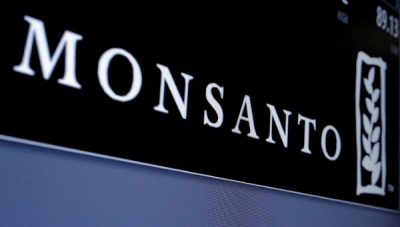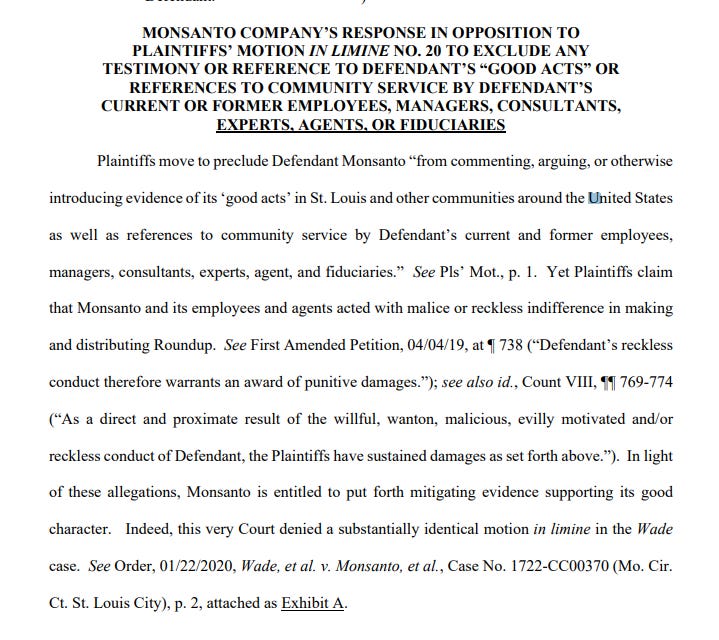Unsettled – Another Monsanto Roundup Case Heads to Trial
Monsanto argues jury should see evidence of company's "good character"

All Global Research articles can be read in 51 languages by activating the “Translate Website” drop down menu on the top banner of our home page (Desktop version).
To receive Global Research’s Daily Newsletter (selected articles), click here.
Visit and follow us on Instagram at @globalresearch_crg and Twitter at @crglobalization. Feel free to repost and share widely Global Research articles.
***
Three people suffering from cancer are set to face off against Monsanto in the latest courtroom battle over allegations that exposure to the company’s Roundup weed killer causes non-Hodgkin lymphoma.
The trial will be the first to take place in the company’s former hometown, with jury selection set to start on March 24. (A previous trial in St. Louis was cancelled just hours before it was scheduled to begin due to a settlement agreement.)
The trial will focus on the complaints of three individuals: Robert Bird, an Iowa man who sprayed Roundup products routinely on a tree farm; Blake Buchan, a 39-year-old Georgia man who used Monsanto’s products to spray fence lines and other areas of two properties he maintained; and Ozie Parker, also of Georgia, who grew up helping out on his family farm, mixing and spraying Roundup weed killers on hundreds of acres for many years.
The plaintiffs allege that Monsanto was well aware of the risks of the active ingredient in its herbicides – a chemical called glyphosate – but hid the risks from consumers, failing to warn them despite scientific evidence showing the cancer-causing potential of the products.
Monsanto denies its products cause cancer, pointing to backing by the Environmental Protection Agency and other regulators around the world for the safety of the glyphosate-based herbicides.
The case is being overseen by St. Louis Circuit Court Judge Michael Mullen, and is expected to last about five weeks, according to court spokesman Jacob Long.
Germany’s Bayer AG bought Monsanto in 2018, but Monsanto has maintained a large presence in the St. Louis area, and lawyers for both sides have been arguing over whether or not the company’s long-standing philanthropic role there could be introduced as evidence of what Monsanto attorneys call the company’s “good character.”
Because the plaintiffs will be seeking to convince the jury that Monsanto was “malicious, evilly motivated” or otherwise engaged in other bad behavior, “Monsanto is entitled to put forth mitigating evidence supporting its good character,” according to a recent court filing.

Plaintiffs attorneys, for their part, have warned that if Monsanto tries to curry favor with jurors by speaking of its charitable contributions to the community, or similar acts, they will be entitled to lay out the company’s long history of involvement with such things as Agent Orange poisonings and PCB contamination of communities across the country.
In a separate court filing on Thursday, lawyers for Monsanto also asked the judge to bar the plaintiffs’ attorneys from engaging in “chicanery” by presenting what Monsanto said would be “inflammatory” or “confusing” information to jurors. Monsanto specifically said the judge should bar any suggestion that jurors should consider their verdict as sending a message to Monsanto or Bayer; or comparisons between Roundup and tobacco, among other things.
The plaintiffs are among more than 100,000 people in the United States who have sued Monsanto claiming that exposure to the company’s glyphosate-based herbicides caused them to develop non-Hodgkin lymphoma. They all additionally allege that Monsanto was well aware of the risks associated with its weed killers but tried to suppress or discredit information about the dangers.
There have been five trials held to date since international cancer scientists declared glyphosate to be a probable human carcinogen in 2015. Monsanto lost the first three trials and won the last two.
Bayer has settled several other cases that were scheduled to go to trial over the last few years.
And in 2020, the company said it would pay roughly $11 billion to settle about 100,0000 existing Roundup cancer claims, and later said it would set aside another $4.5 billion toward Roundup litigation liability.
Bayer also announced it would stop selling Roundup, and other herbicides made with the active ingredient glyphosate, to U.S. consumers by 2023.
Courtroom View Network has requested to livestream the trial proceedings and the parties are scheduled to meet with the judge on Monday to discuss the request.
*
Note to readers: Please click the share buttons above or below. Follow us on Instagram, @globalresearch_crg and Twitter at @crglobalization. Feel free to repost and share widely Global Research articles.

